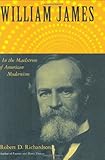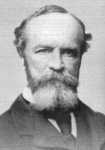
A while back, during a recording for the Technometria podcast, Matt Asay mentioned he was reading a biography of William James. I'm not sure what intrigued me about what he said, but right after the broadcast I ordered a copy. It took me a while for it to get to the top of my reading list, but it finally did and I read it during my trip to Banff for WWW2007.
William James was one of the members of the polymath James family, his brother was the famous novelist Henry James and his sister Alice was famous for her posthumously published diary. He came of age during the Civil War and died in 1910. He had profound influence on the development of modern American philosophy and the field of psychology. He lived a fascinating life.
William James (click to enlarge) |
This was a book well worth reading and one I couldn't put down at times. I love biographies in any event and this was about a period, subject, and person I was not well acquainted with. There is much to recommend this book, including the fact that it's well researched, well written, and engaging. Here are some of my favorite quotations from the book:
That is "the element of Faith" which [James] adroitly defines as "belief in something concerning which doubt is still theoretically possible: and as the test of belief is willingness to act, one may say that faith is the readiness to act in a cause the prosperous issue of which is not certified to us in advance." (p. 202)
James's mood, in the fall of 1880 and in general now, was not skeptical or contradictory. "I am tired," he wrote to Davidson, "of the position of a dried-up critic and doubter. The believer is the true full man." (pp. 210-211)
"To anyone who has looked on the face of a dead child or parent," he wrote in 1907, "the mere fact that matter could have taken for a time that precious form, ought to make matter sacred for ever after. It makes no difference what the principle of life may be, material or immaterial, matter at any rate co-operates, lends itself to all life's purposes. That beloved incarnation was among matter's possibilities." (p. 257)
"Whenever a desired result is achieved by the cooperation of many independent persons, its existence as a fact is a pure consequence of the precursive faith in one another of those immediately concerned...A whole train of passengers (individually brave enough) will be looted by a few highwaymen, simple because the latter can count on one another, while each passenger fears that if he makes a movement of resistance, he will be shot before anyone else backs him up. If we believed that the whole car-full would rise at once with us, we should each severally rise, and train robbing would never even be attempted...There are, then cases where a fact cannot come at all unless a preliminary faith exists in its coming." (pp. 362-363)
"In the mater of conversion," James wrote, "I am quite willing to believe that a new truth may be supernaturally revealed to a subject when he really asks. But I am sure that in many cases of conversion it is less a new truth than a new power gained over life by a truth always known." (p. 365)
James dives in by declaring simply that "the best fruits of religious experience are the best things that history has to show." Put in personal, psychological terms, "the man who lives in his religious center of personal energy, and s actuated by spiritual enthusiasm differs from his previous carnal self in perfectly definite ways." The saintly character, then, is "the character for which spiritual emotions are the habitual center of the personal energy," and such a person seems to James to possess, on the whole, four fundamental inner conditions. First is "a feeling of being in a wider life than this world's selfish little interests." Second is "a sense of the friendly continuity of the ideal power with our own life, and a willing self-surrender to its control." This is "an immense elation and freedom, as the outlines of the confining, self-hood melt down." Fourth is "a shifting of the emotional center towards loving and harmonious affections," a shifting toward the yes! yes! of emotional impulses and away from the no! No! of our inhibitions. (p. 410)
The book is full of such thoughts--especially after you get through James's early years. One of the things that's fascinating to me is the route James took to his greatness. He spent much of his twenties undecided about his life and searching for what he wanted to become.
Sometimes I pick up a biography and find it nothing more than a dry recitation of the facts, but this is not one of those books. Richardson reaches into the mind of the man and brings William James alive again.





